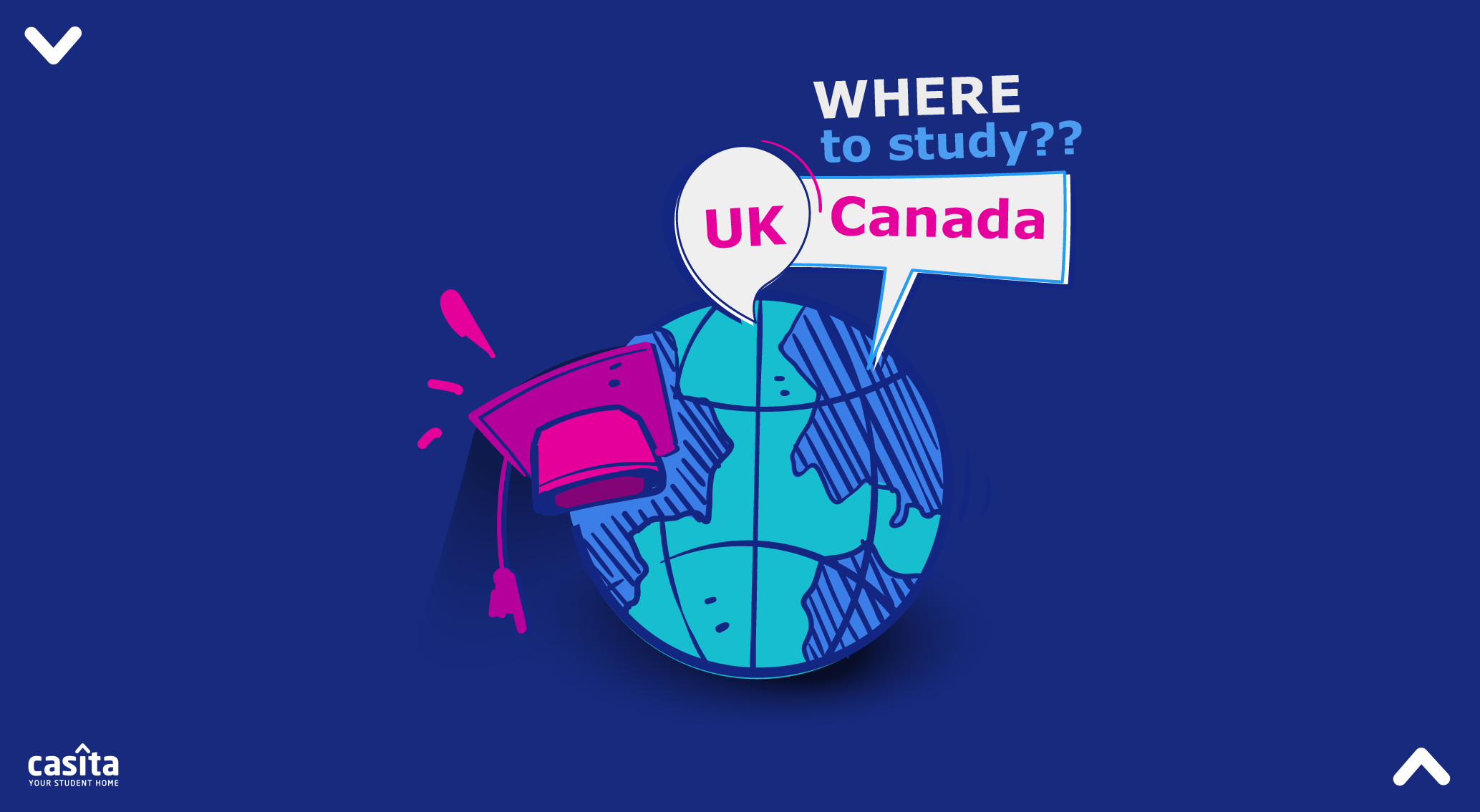Where Should You Study Abroad? UK vs Canada
Tips and Advice
Exploring
5 mins read
Share

Updated at: 25 November, 2025
Published at: 09 February, 2023
By Allaa Ashraf
Where Should You Study Abroad? UK vs Canada
Tips and Advice
Exploring
5 mins read

Updated at: 25 November, 2025
Published at: 09 February, 2023
By Allaa Ashraf
Share
So you’re almost done with high school, and you’re contemplating studying abroad. You compile a list of potential countries you’d like to study in, and it comes down to two: the UK and Canada, but you’re at a loss and cannot decide which one it will be.
So, did we strike a nerve? Did we get it right? I bet! It’s a tough decision to make, especially because the two countries make fantastic study destinations and are quite popular among international students. But here’s the real question you should be asking yourself: “Which country is best for me?” Then you need to consider the multiple factors that will influence your final decision.
We’re not going to leave you hanging there for long, though. In this article, we break down the differences between the UK and Canada to help you make the right decision. So, shall we?
.jpg)
1. Quality of Education and Universities
United Kingdom
According to the Times Higher Education, there are over 100 public institutions in the UK, 11 of which are listed among the top 100 universities worldwide. Four of the UK's esteemed schools, including the illustrious Oxbridge (Universities of Oxford and Cambridge), are ranked among the top 20 in the world for their excellence in education. Classes are lecture-based, and your final grade is entirely determined by your performance on the semester finals. When applying in the UK, you must determine the final degree choice at the time of application.
Canada
There are 90 universities in Canada, 30 of which are ranked internationally, including the Universities of Toronto and British Columbia. Despite Canadian universities having three entries in the top 100, the Universities of Toronto, British Columbia, and McGill rank among the best in the world for business management and STEM courses. Within the confines of a predetermined curriculum, it allows for course selection, exploration, and/or customisation.
2. Popular Majors and Course Structure
United Kingdom
The UK has a variety of popular courses that usually attract international students. These include Nursing, Psychology, Law, Computer Science, Design, and Medicine.
Most UK courses are lecture-based, and exams and assignments will make up most of your score. While students in degree programmes that focus on the arts spend more time in discussion-based classes and are actively creating, science and math students spend more time in lab or clinical settings.
Canada
As for Canada, it attracts international students due to its excellence in the following subjects: Agricultural Science and Forestry, Business Management, Bioscience, IT and Computer Science, Finance, and Engineering.
Exams and assignments are used to determine grades in Canadian universities. However, there might be additional initiatives and learning that are based on research. Your final grade will be influenced by assignments, group projects, and workshops.

3. Tuition Fees and Cost of Living
United Kingdom
One of the most expensive international education programmes is thought to be offered by the UK. For exact costs, check out your university's website, but expect to pay anywhere between £14,000 and £22,000 for undergraduate and graduate programmes.
Accommodation in the UK typically costs between £500 and £1,600 a month, with food and groceries costing between £150 and £250. With rent included, you'll need about £15,000 a year.
Canada
The cost of tuition varies widely among Canadian universities, and it mostly depends on the major you choose. Undergraduate tuition in Canada can be around £21,000. Average tuition costs for postgraduate degrees come to around £13,000.
In Canada, rent ranges from £1,750 to £5,600 a month, while food and groceries cost between £400 and £600. You'll need about $13,000 a year for living expenses, although this amount might go as low as $8,550 or as high as over $15,000.
4. Student Work Visa and Postgraduate Work Visa
United Kingdom
As an international student studying in the UK, you are permitted to work up to 20 hours per week during the academic year and an unlimited number of hours outside of it.
After receiving a post-study work visa, you can remain in the UK after graduating for up to two years while working or looking for a job. International students can now apply for the new post-study work visa (Graduate Route Visa) through the UK Home Office.
Canada
International students are permitted to work 20 hours per week in Canada, either on or off campus, with their visa.
Canada issues work visas to graduates. Upon completing their studies at a post-secondary institution, international students can work in Canada for up to three years after obtaining a Canadian post-graduation work visa.

5. Popular Job Prospects
United Kingdom
Lawyers, IT directors, engineers, orthodontists, dermatologists, advertising and public relations directors among others, are some of the high-paying professions in the UK.
Canada
In Canada, project managers, HR directors, nurses, IT managers, financial analysts, engineers, and more are in high demand.
6. Lifestyle and Culture
United Kingdom
There are many outdoor activities available year-round in the UK due to its great climate, and you are not too far from the ocean. Additionally, travelling to other European nations is quite simple. The UK is a diverse country, and each region has its very own attractions, so no matter if you prefer the bustle of big cities, the beauty of the countryside, or the chance to see a few castles, you'll find it there!
Canada
If you enjoy outdoor activities, Canada is the place for you. In fact, one of the most well-liked ski locations worldwide is Canada. The nation boasts stunning landscapes, lakes, and more than 45 national parks. A lot of fun may be had in Canadian cities as well, particularly Old Quebec, one of the earliest European colonies in North America. A trip to Toronto might also be fantastic and include visiting thrift shops, live theatres, and museums.
And there you have it! We’re pretty confident that we managed to clear things up to help you make an informed decision about where you want to study. Wherever you ultimately decide to study, you'll have to decide which country you would rather live in. So, which one is it going to be for you?

Frequently Asked Questions
Amongst the UK and Canada, which is more economical in terms of tuition fees?
A postgraduate programme in Canada is generally more affordable than an undergraduate programme in the UK.
Is IELTS compulsory for UK and Canada both?
Suppose English is not your native tongue, and you apply from such a country. In that case, you must demonstrate your English language competency using IELTS, TOEFL, PTE, etc.
Can I work part-time in UK and Canada while pursuing my studies?
Yes. A student is permitted to work a maximum of 20 hours per week while attending classes. They may work full-time on holidays.
What are the student visa fees for UK and Canada both?
If a student is applying from outside the UK, they must pay a fee of £363 to apply for a UK student visa. The cost of a student visa for Canada is CAD 150, and CAD 350 is required to reinstate your student status.
Which of the UK and Canada has better universities?
Both the UK and Canada are excellent places to study. The UK has an advantage when it comes to university rankings because four of its institutions are among the top 10 according to the QS World University Rankings 2023. Some of the UK universities that stand out and have been recognised as leaders in education and research include the Universities of Cambridge, Oxford, Imperial College London, and others.
Tips and Advice
Exploring
By Allaa Ashraf
Share
Tips and Advice
Exploring
Updated at:
Published at:
By Allaa Ashraf
Share


